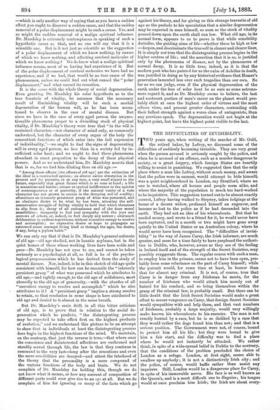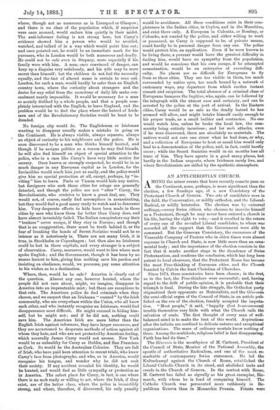THE DIFFICULTIES OF INVISIBILITY.
TWO years ago, when writing of the murder of Mr. Gold, the retired baker, by Lefroy, we discussed some of the difficulties of suddenly becoming invisible. They are very great when the person accused is seriously sought by the police, and when he is accused of an offence, such as a murder dangerous to society, or a great forgery, which foreign States are heartily willing to assist in punishing. We suggested then that the only place where a man like Lefroy, without much money, and aware that the police were in earnest, would attempt to bide himself, was a quiet neighbourhood in London, say Stratford, where no one is watched, where all houses and people seem alike, and where the majority of the population is much too hard-worked to be inquisitive. This suggestion turned out to be almost exactly correct, Lefroy having walked to Stepney, taken lodgings at the house of a decent widow, professed himself an engraver, and become as lost to the police as if he had descended into the earth. They had not an idea of his whereabouts. But that he needed money, and wrote to a friend for it, he would never have been captured, and in a month or two might have gone away quietly to the United States or an Australian colony, where he would never have been recognised. The "difficulties of invisi- bility " in the way of James Carey, the Irish informer, are much greater, and seem for a time fairly to have perplexed the authori- ties in Dublin, who, however, aware as they are of the feeling in Ireland itself and of the strength of the Secret Societies, may possibly exaggerate them. The regular course with such a man, to employ him in the prisons, seems not to have been open, pro- bably from some reluctance on the part of Carey himself; while the pursuit would, for some time at least, be keener than that for almost any criminal. It is not, of course, true that Carey is in danger from any Irishman he meets, for the number of Irishmen who would attack him merely out of hatred for his conduct, and so bring themselves within the grasp of the criminal law, is probably smalL But there can be little doubt that the Irish Secret Societies would make a great effort to secure vengeance on Carey, that foreign Secret Societies would sympathise with and help them, and that vast numbers of Irishmen, probably a large majority, would very willingly make known his whereabouts to his enemies. The man is not exactly hunted by a race, but he is so disliked by a race that they would rather the dogs found him than not; and that is a serious position. The Government were not, of course, bound. to protect him all his life ; but they were bound to give him a fair start, and the difficulty was to find a place where he would not instantly be attacked. We rather think, in spite of a wide-spread belief in Dublin to the contrary, that the conditions of the problem precluded the choice of London as a refuge. London, at first sight, seems able to swallow up anybody ; it is not a distinctively Irish city ; and the police, of course, would baffle rather than assist any inquirers. Still, London would be a dangerous place for Carey, in spite of his immovable nerve. His face is as well known as the Queen's, and is a most difficult one to disguise; his tongue would at once proclaim him Irish; the Irish are about every-
where, though not as numerous as in Liverpool or Glasgow ; and there is no class of the population which, if suspicion were once aroused, would endure him quietly in their midst. The anti-informer feeling is not strong here, but Carey's evidence showed him a person who would be avoided, watched, and talked of in a way which would point him out; and once pointed out, he would be an immediate mark for his pursuers, who in London would be both numerous and deadly. He could not be safe even in Stepney, more especially if his family were with him. A man, once convinced of danger, can keep up a disguise very sedulously, and his wife may be more secret than himself; but the children do not feel the necessity equally, and the fact of altered name is certain to ooze out. London, for such a man, would hardly be safer than an English country town, where the curiosity about strangers and the desire for any relief from the monotony of daily life make con- cealment nearly impossible. It would be necessary for a man so acutely disliked by a whole people, and that a people com- pletely intermixed with the English, to leave England, and the. problem would be to find the place where the hatred of Irish. men and of the Revolutionary Societies would be least to be dreaded.
No foreign city would do. The Englishman or Irishman wanting to disappear usually makes a mistake in going on the Continent. He is always visible, always separate, always an object of cariosity to his neighbours and the police. He is soon discovered to be a man who thinks himself hunted, and though if he assigns politics as a reason he may find friends, he will also find himself an object of special attention to the police, who in a case like Carey's have very little motive for secrecy. Once known or strongly suspected, he would be in as much danger in any European capital as in London, for the Invincibles would reach him just as easily, and the police would give him no special protection at all, except, perhaps, by "in- viting" him to leave. Paris or Vienna would hide any native, but foreigners who seek those cities for refuge are generally detected, and though the police are not " after " Carey, the Revolutionists, who contrive to know a great deal, are. They would not, of course, easily find accomplices in assassinating, but they would find a good many ready to watch and to denounce him. Very desperate efforts to hide have been made in those cities by men who know them far better than Carey does, and have almost invariably failed. The Italian conspirators say their " traitors " never escape, if they stay in Europe; and though that is an exaggeration, there must he truth behind it, or the fear of breaking the bonds of Secret Societies would not be so intense as it notoriously is. There are not many Irish, it is true, in Stockholm or Copenhagen ; but then also no Irishman could be lost in those capitals, and every stranger is a subject of observation. Carey, moreover, would want to live where men spoke English ; and the Government, though it has been by no means lenient to him, giving him nothing save his pardon and insisting on obedience, would, we presume, pay some attention to his wishes as to a destination.
'Where, then, would he be safe ? America is clearly out of the question. Almost any one, however hunted, whom the people did not care about, might, we imagine, disappear in America into an impenetrable mist ; but there are exceptions to that rule. The American police do find criminals when they choose, and we suspect that an Irishman " wanted " by the Irish community, who are everywhere within the Union, wbo all know each other, and who instantly recognise an Irishman, would find disappearance most difficult. He might succeed in hiding him- self, but he might not ; and if he did not, nothing could save him. The American Irish are more bitter than the English Irish against informers, they have larger resources, and they are accustomed to desperate methods of action against all whom they hate, and who are not protected by American feeling, which assuredly James Carey would not arouse. New York would be as unhealthy for Carey as Dublin, and San Francisco as Cork. So would be the Australian Colonies. They are full of Irish, who have paid keen attention to recent trials, who know Carey's face from photographs, and who, as in America, would recognise his tongue, and wonder why he did not seek their society. If any accident revealed his identity, he would be hunted, and would find as little sympathy or protection as in America. The safest place for Carey, in fact, is one where there is no mob ready or willing to act, where the Irish, if they exist, are of the better class, where the police is irresistibly strong, and where, therefore, if discovered, his only penalty would be avoidance. All these conditions exist in their com- pleteness in the Indian cities, in Ceylon, and in the Mauritius, and exist there only. A European in Calcutta, or Bombay, or Colombo, not wanted by the police, and either willing to work or possessed, as Carey is supposed to be, of private means, could hardly be in personal danger from any one. The police would protect him, on application. Even if he were known to be living there, a pursuer would have the greatest difficulty in finding him, would have no sympathy from the population, and would be conscious that his own escape, if he attempted assassination, would be an enterprise of exceeding diffi- culty. No places are so difficult for Europeans to fly from as these cities. They are too visible in them, too much surrounded by native eyes, too much bound by a network of customary ways, any departure from which excites instant remark and suspicion. The total absence of a criminal class of Europeans hampers the fugitive, who, again, can be followed by the telegraph with the utmost ease and certainty, and can be arrested by the police at the port of arrival. In the Eastern cities, Carey would be as safe as the deadly hatred he has aroused will allow, and might betake himself easily enough to his proper trade, as a small builder and contractor. No one would watch him, unless he broke the local law, the oom- munity being entirely incurious ; and for mob attacks, even if he were discovered, there are absolutely no materials. The natives would not care one straw what he had done, or why, and a collection of Europeans to hoot or assail him would only lead to a demonstration of the police, and, in fact, could hardly occur ; while the Secret Societies would in six months lose all trace of him. They have agents in a good many places, but hardly in the Indian seaports, where Irishmen rarely live, and where Revolutionists are stifled by the apathetic atmosphere.



































 Previous page
Previous page